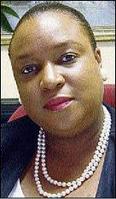Daraine Luton, Sunday Gleaner Reporter
Coke-Lloyd
NOT TOO long ago, males were the dominant gender in many jobs in the society, including at gas stations, where they worked as attendants.
Nowadays, jobs like these are going with greater regularity to females. Males also continue to be heavily outnumbered in professional jobs.
Jacqueline Coke-Lloyd, executive director of the Jamaica Employers' Federation, says many of Jamaica's working men are engaged in low-end jobs. She says that employers prefer to hire females, even in positions as gas-station attendants, because "females tend to be more reliable".
males overlooked
Some men have dismissed the claim. Several unemployed Corporate Area men tell The Sunday Gleaner males are being overlooked for jobs at gas stations simply because of their gender.
"Dem put di woman dem pon di pump because dem sexy and dat will attract customers; man stop when dem si dem," says one of the men.
However, this argument has been dismissed by one Corporate Area gas-station owner/manager, who says the attractiveness of women, as opposed to men, has little bearing on the decision to employ a man as opposed to a woman.
The businessman, who asked not to be named, says women often sell themselves better at interviews and give a better account of themselves on the job.
"Ladies tend to be more dedicated; they tend to be more punctual; they are more committed, and they take the job more seriously," the manager says.
He adds that older men are also dedicated, but the energy and customer service that women take to the pumps put them far ahead of the men.
"Men will come to work and will find the time to disappear and smoke a spliff," the manager says. "On the other hand, the women will stay on the pump island and greet the customers and because of this, even though men and women get the same pay, the women go home with far more money than the men because the tips they get are unbelievable," he explains.
underqualification
It is not just this supposed unreliability, but also the underqualification of Jamaican males for several jobs that is of concern to employers. Last week, hundreds of hopeful job applicants flocked the offices of the Ministry of Labour and Social Security, each trying to land one of 450 construction jobs that will be offered by employers from Canada. However, of the 1,400 applicants who visited the offices of the ministry, many of whom were men, few had the necessary certification to take up these jobs.
While males are being shoved out of low-paying jobs, there is no evidence to suggest that they are gaining jobs in more prestigious areas. In excess of 40,000 more females than males are employed as professionals, officials and technicians, according the the 2006 Labour Force survey published by the Statistical Institute of Jamaica.
Also, there are over 62,000 more females working as clerks than males. The only occupational groups in which men outperform women are craft and related industries, plant and machine operators, and agriculture and fishery.
endangered species
Damion Crawford, a former president of the Guild of Students at the University of the West Indies, Mona, says the absence of males from both the classroom and the office is a cause for concern.
"Our males are now an endangered species," Crawford comments.
"I think the time has come for some serious evaluation as to what it is that is causing our boys not to achieve more. If society is to advance, they must play an integral part in its development," says Crawford. "Males like us, who have achieved, must help in empowering them. The family needs them, businesses need them, and the society needs them," he adds.
According to the 2006 Labour Force survey, there is a 21 per cent difference between males and females in the labour force who have a degree. Some 56,000 persons whose highest level of education is a degree, are females, while 35,700 are males, according to the survey.
"What we are seeing is a reversal of what used to happen years ago," Coke-Lloyd says, drawing a parallel with the years when women were outnumbered in the working world.
"Over 70 per cent of persons in management are females. We don't want this. If you have a society where the males are not contributing significantly to society, it is a reason for deep concern, not only for family, but for nation building," Coke-Lloyd reasons.
STATIN figures indicate that 697,800 males are in the labour force, that is, they are above the age of 14 and are either working, looking for work or available for work. Of this number, 549,500 or 79 per cent of males in the labour force have passed no CXC CSEC subjects, which many believe, explains why men are struggling to keep up with females.
daraine.luton@gleanerjm.com

